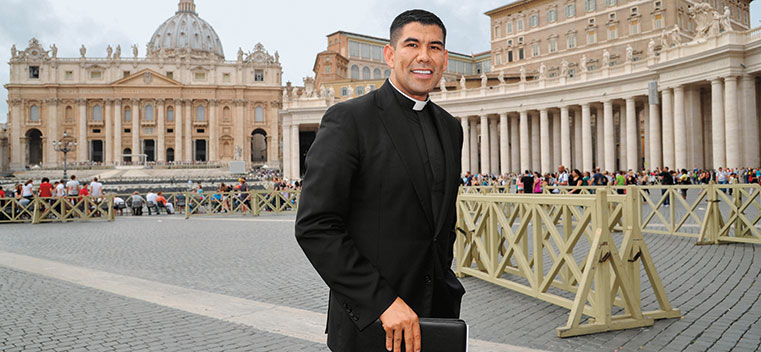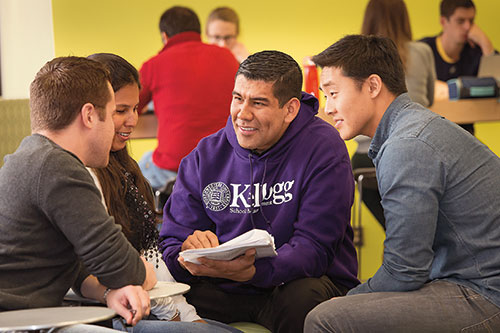
Holy Cow!
Sean Hargadon is senior editor of Northwestern magazine.
Tell us what you think. E-mail comments or questions to the editors at letters@northwestern.edu.
Ever wonder about those strange designations we use throughout Northwestern to identify alumni of the various schools of the University? See the complete list.
Find Us on Social Media
Kellogg MBA student Manuel Dorantes puts his education in nonprofit management and marketing to good use as an up-and-coming leader in the Catholic Church.
The chants rose to the roof of the Owen L. Coon Forum: “Manny! Manny! Manny!”
The Cash Cows had just won the Kellogg School of Management’s new student Olympics, and soon Manny — who had emerged as a leader during the weeklong orientation program that pits teams of first-year MBA students against each other in collaboration-inducing competitions — was being tossed in the air.
"It was like a high school football game for me,” says Manuel Dorantes, who is also known as “Father Manny.” “It was phenomenal.
"They had no idea who I was,” adds Dorantes, a Chicago diocesan priest who had ditched the collar for his Cash Cows team T-shirt throughout Kellogg’s Complete Immersion in Management Week. “So on Monday, the first day of class, I show up with my collar on, and you should have seen the jaws drop. My classmates [who knew there was a clergyman in the class] were like, ‘You’re the Catholic priest? Are you serious?’
I think they were disappointed,” he says with a laugh.
Dorantes is now a second-year MBA student who splits his time between Chicago and the Vatican, where he occasionally works as a liaison to the Spanish-speaking media for the press office of the Holy See, the central government of the Roman Catholic Church. Dorantes’ first major assignment was the canonization of Pope John XXIII and Pope John Paul II last April. It was an unforgettable experience, he says.
In the fall Dorantes studied change management and global economics through Kellogg’s International Exchange Program at the London Business School — a convenient two-hour flight from Rome — after a paid summer internship with PricewaterhouseCoopers as a financial services consultant in the fraud and money laundering department for a Chicago client. (Unlike priests in a religious order — Jesuits or Franciscans, for example — diocesan priests do not take a vow of poverty. Dorantes manages his own finances and is paying his own way at Kellogg with help from an F.C. Austin Scholarship.)
Dorantes has come a long way from his roots in Ixtapan de la Sal, a town in the State of Mexico near Mexico City. He immigrated to the United States with his mother when he was 12 years old. Dorantes struggled with the language and culture but graduated from Waukegan High School at 16 and in 2000 entered St. Joseph College Seminary, a preseminary philosophy program affiliated with and based at Loyola University Chicago.
That’s when the priest sex abuse scandal broke. “Every single day as a young seminarian I read another story of why I shouldn’t be a priest,” says Dorantes. “I saw church leaders doing a poor job with the media, just being tossed around and not really knowing how to respond.
“I was wrestling with this internally: If God were really calling me to be a priest in the United States, dealing with the media was going to be in my path. I discerned that seeking a journalism degree was the way to go, and then, if God were still calling me, I’d be back at seminary after I finished the degree.”
With permission from his superiors, Dorantes started a broadcast communications program at Loyola and was soon interning with Telemundo Chicago. “That was a formative time for me,” he says. “[To start the day] I was doing morning prayer and going to Mass and thinking about philosophical questions. And then in the afternoon, I would jump in a helicopter to cover a shooting on the South Side.”
After earning his degree in communications and philosophy from Loyola, Dorantes began his studies at Mundelein Seminary. He briefly interrupted his seminary training to work for Univision, a U.S. Spanish-language television network, at its Miami headquarters.
Dorantes completed his studies at Mundelein and, following a stint as an associate administrator at Catholic Charities in Chicago, was ordained in 2010 and assigned as an associate pastor at St. Clement in Chicago’s Lincoln Park neighborhood. He knew he needed to become social media savvy to reach the parish’s young adult congregation.
One Sunday, when the homily was about being Christian in the public square, he said, “I am going to challenge all of you today. I want you to take out your phones and check in on Facebook that you’re at St. Clement, outing yourself as a Catholic,” recalls Dorantes, who has more than 3,500 followers on Twitter (@TweetingPriest). “And it’s not going to bother me if you hear something during the homily that touches your heart in a special way for you to tweet that message or put it as your Facebook status.
“One young person from the congregation started tweeting most of the homily. Then I realized that she had 5,700 followers, way more people than I had present in church that day. That’s the power of social media.”
After four years at St. Clement, Dorantes was considering his next steps and says he asked Cardinal Francis George, then Chicago’s archbishop, about the church’s biggest need. “Without even blinking,” Dorantes recalls, “he said, ‘Manny, we need help with management.’ ”
“When I look at talent management, for example, and the way that some big multinational corporations do it, I think, ‘How do we really empower our priests and lay employees, how do we let them know that their talents are recognized by the church?’ ” — Father Manny Dorantes
Dorantes had his mission. He applied to business schools, and chose Kellogg in part because of Dean Sally Blount’s commitment to forming “leaders who are going to create an impact in the world,” he says.
“This is an incredible opportunity, an incredible tool set — the education, the networking, the history — that we get to own. What are we going to do with this? Yes, the temptation is to try to amass more riches for ourselves, because that sets us up for the future. That’s the typical business student attitude. What I have seen at Kellogg is precisely that it’s larger than that — it’s about helping others grow.”
Every day in class, Dorantes says, he sees opportunities to improve church management. “When I look at talent management, for example, and the way that some big multinational corporations do it, I think, ‘How do we really empower our priests and lay employees, how do we let them know that their talents are recognized by the church?’ ” says Dorantes, who is focusing his studies in three areas: nonprofit management, marketing and management in organizations.
Kellogg, which has been educating nonprofit leaders since the ’70s, offers a nonprofit focus that is both curricular and co-curricular, with MBA courses and a portfolio of executive education programs through the Center for Nonprofit Management, as well as experiential learning opportunities. “We strongly believe that leadership is leadership, management is management, no matter what situation you’re doing it in,” says Liz Livingston Howard ’86, ’93 MMGT, director of nonprofit executive education and clinical associate professor of management. “When we talk about students interested in social impact, meaning using business skills to change the world, it’s a fairly significant percentage of the student body,” she says. And in the most recent survey of Kellogg alumni, 90 percent reported being connected to the nonprofit sector, either as professionals, board members, volunteers or donors.

Manny Dorantes, center, chats with his second-year Kellogg classmates, from left, Ron Mantel, Lorena Ginocchio and Leon Lee at the Donald P. Jacobs–Kellogg Center. Photo by Michael Goss.
For Dorantes, who says he misses his role as a parish priest, there’s no shortage of opportunities to shepherd a new congregation among his Kellogg classmates. He celebrates Mass once each quarter for 80 or more of his fellow students, not all of them Catholic, at the Wilmette, Ill., home of Harry Kraemer ’79 MMGT, clinical professor of strategy at Kellogg. The gathering often starts with readings and discussion about Christian, Jewish or Muslim religious texts. “It opens up a space to talk about spirituality within our group,” says Dorantes, who led 12 classmates on a 2013 spring break tour of Jerusalem and the West Bank that included a visit to a Syrian refugee camp in Jordan.
“He’s a great example of the best characteristics of a leader,” says Kraemer, who teaches on the topic. “He’s obviously self-reflective. He looks at things in a very balanced way. He has what I call true self-confidence. And he’s got enough genuine humility to always remember where he came from and not get caught up in it ever being about him. He realizes that every single person matters.”
Dorantes plans to graduate in June and then he’ll likely begin a new assignment from Chicago Archbishop Blase Cupich while continuing his Vatican responsibilities. Dorantes hopes he can apply the lessons he’s learned at Kellogg to some of the more pressing problems facing the church, including an issue that’s deeply personal — immigration.
On a national level, Dorantes says, immigration is a moral — not political — issue. “It’s one of the things that Jesus said to do, right? Feed the hungry, clothe the naked and welcome the immigrant, welcome the stranger. It’s in Matthew. It can’t be any clearer than that. …
“There are still parishes in our country today where immigrant Catholics have to rent space from the local pastors so they can hear the Mass in Spanish. This should not be happening.”
In Chicago alone, there are about 1 million Spanish-speaking Catholics. “In any organization, if you were CEO, that demographic would be a prime target that you would want to identify and allocate resources to,” he says.
Armed with his Kellogg credentials, Dorantes is already thinking like an executive — albeit one with a higher calling. “I see my classmates going through recruiting with all the companies they want to work for,” he says. “And there’s such a great freedom in knowing whom I’m committed to. No matter what the assignment is, ultimately I trust that it’s God’s voice behind that.”



 Facebook
Facebook Twitter
Twitter Email
Email


